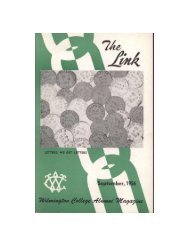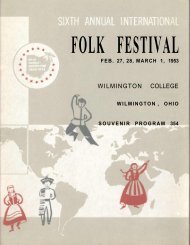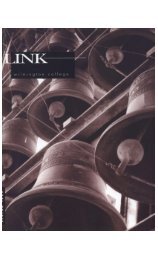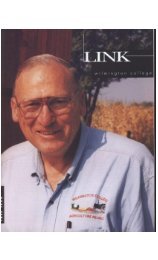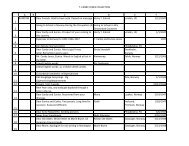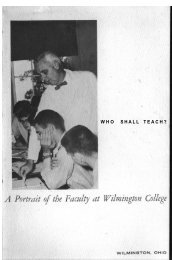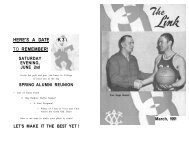Link 1995 10 (Vol. 45, No. 3).pdf - DRC Home - Wilmington College
Link 1995 10 (Vol. 45, No. 3).pdf - DRC Home - Wilmington College
Link 1995 10 (Vol. 45, No. 3).pdf - DRC Home - Wilmington College
Create successful ePaper yourself
Turn your PDF publications into a flip-book with our unique Google optimized e-Paper software.
"The United States doesn't depend on<br />
the services of those agencies because it has<br />
built up national services, but these have<br />
made a tremendous difference in many developing<br />
countries," he said. "Without them,<br />
there would be more disease, poverty and<br />
famine."<br />
In spite of its apparent successes, some<br />
of the more "radical" elements on the American<br />
political landscape are calling for the<br />
United States to withdraw its financial commitment<br />
and reconsider participation in the<br />
United Nations. Many proponents of this<br />
isolationist view believe the UN has evolved<br />
into a cumbersome, ineffective, sprawling<br />
bureaucracy, and the United States and regional<br />
organizations like NATO acting alone<br />
can be more effective.<br />
"The United Nations has become a<br />
whipping boy for know-nothings who are<br />
trying to establish themselves as authorities<br />
on something that they clearly know nothing<br />
about," Collett said.<br />
The United States' UN dues are between<br />
$250 and 300 million annually — less<br />
than the cost of a single B-l bomber; not to<br />
mention some $700 million is pumped into<br />
New York City's economy as a result of the<br />
UN headquarters'<br />
presence, he said.<br />
"The figures<br />
which were spent<br />
on the UN by our<br />
country are completely<br />
in every way<br />
dwarfed by the kind<br />
of military spending<br />
that is still go<br />
ing on in the US ^ " ~<br />
even though the<br />
Cold War has ended — there is absolutely<br />
no excuse for that," Collett said. "It is immoral,<br />
insane and bad economics."<br />
The 52,000 people associated with the<br />
United Nations is equal in size to the number<br />
of civil service employees in Wyoming,<br />
a state with only a half million people.<br />
Even though Bill Clinton has expressed<br />
his support of the United Nations, Collett<br />
was perplexed with the president's speech<br />
at the UN's 50th anniversary commemoration<br />
in San Francisco in which he said the<br />
United Nations is in need of reform.<br />
"You can always make an organization<br />
better and things should be done, but I don't<br />
think there is a lot of dead wood in the<br />
18 Fall <strong>1995</strong><br />
—<br />
United Nations and I don't think it wastes<br />
money," he said. "I mean waste money?<br />
Who are you comparirg it with, the Pentagon<br />
or Italy?"<br />
Collett said America's active support<br />
and participation is of paramount importance<br />
for the mission of the UN to succeed.<br />
"This impression hat we get from the<br />
newspapers that somehow the United States<br />
and United Nations disagree about something<br />
is really a fallacious perspective," he<br />
said. "The United State s — and this is clear<br />
to the other govern menl s and anybody working<br />
within the UN — fl e United States very<br />
much determines whai the UN is going to<br />
do, because of its size, power and its role in<br />
the Security Council.<br />
"The Security Coi ncil decides nothing<br />
that the US doesn't ag ee to," he added.<br />
The United States is among the five<br />
permanent members o' the Security Council<br />
that also includes Russia, China, France<br />
and Great Britain.<strong>No</strong>t only that, Collett said<br />
the world looks at the United States as a<br />
benchmark of civilization as the world approaches<br />
the new millennium.<br />
"All of the other countries and I underline<br />
all — not only our allies, but those who<br />
are our former<br />
"The United Nations has become a<br />
whipping boy for know-nothings who<br />
are trying to establish themselves as<br />
authorities on something that the}<br />
clearly know nothing about."<br />
— Stephen Colleti:<br />
—<br />
enemies that are<br />
now in that gray<br />
field — look to<br />
the United States<br />
for leadership,"<br />
he said.<br />
"We have to be<br />
careful because<br />
we have been<br />
' guilty of isolationism<br />
at other<br />
critical times in history," he said, noting it<br />
leaves a very large vacuum when the United<br />
States does not live jp to its role. "We<br />
should learn from hisiory and assume the<br />
responsibilities that go with being a great,<br />
powerful and very rich nation.<br />
"We can give leadership; we should be<br />
giving leadership — we should be supporting<br />
a strong United Nations!"<br />
As to how the United States' leadership<br />
can manifest itself, Collett said the UN<br />
needs to increase the fcrums for negotiation<br />
and adjudication of disputes — from small<br />
fishing rights disputes' to larger territorial<br />
disputes. The World Court and other mediation<br />
entities need to ~>e built up and ex-<br />
The Collett File •<br />
Stephen W. Collett grew up in southwestern<br />
Ohio with a strong affiliation<br />
with the <strong>Wilmington</strong> and Ohio Valley<br />
Yearly Meetings of Friends (the Quakers).<br />
He attended Haverford <strong>College</strong> and<br />
then <strong>Wilmington</strong>, graduating in 1970<br />
with double majors<br />
in philosophy/religion<br />
and history/<br />
political science.<br />
While at WC, he<br />
worked on the <strong>College</strong><br />
dairy farm.<br />
In 1973, he<br />
earned a master's<br />
degree in human<br />
geography from the University of Colorado,<br />
where he specialized in resource<br />
use, development and population issues.<br />
For the past 20 years, Collett, his<br />
wife, Berit, and their seven children have<br />
had their principal home in Farsund,<br />
<strong>No</strong>rway. The Colletts farmed there and,<br />
for <strong>10</strong> years, he taught economics, international<br />
affairs and geography at Agder<br />
<strong>College</strong> in Kristiansand. In 1986, Collett<br />
took a temporary position at Earl ham<br />
<strong>College</strong> for six months, teaching and<br />
serving as a special assistant to the president.<br />
Collett and his wife became directors<br />
of the Quaker United Nations Office<br />
in 1986. He specializes in questions of<br />
environment and development, and regional<br />
security and peacemaking.<br />
Also, he has authored and coauthored<br />
numerous books and articles<br />
on economic development, international<br />
trade and international organizations.<br />
panded in scope; also, population and environmental<br />
issues need to come even more to<br />
the forefront of UN attention, he said.<br />
"The two great challenges for the 21st<br />
century are the need to get our societies onto<br />
the path of sustainable development and to<br />
establish an international system for maintaining<br />
peace and security that will replace<br />
these kind of false mechanisms of the Cold<br />
War," he said.<br />
"It won't mean that you don't have



